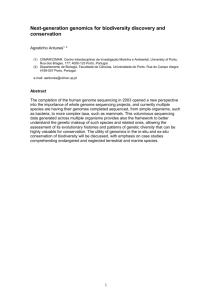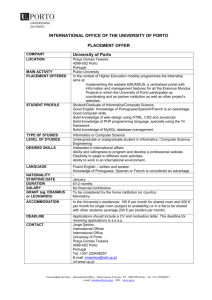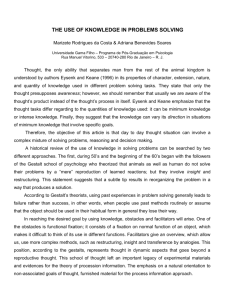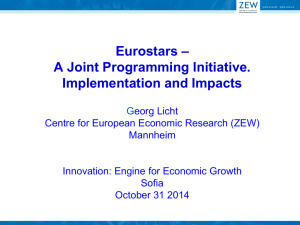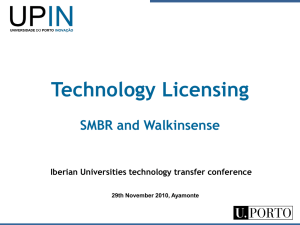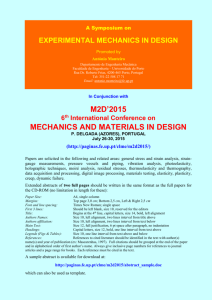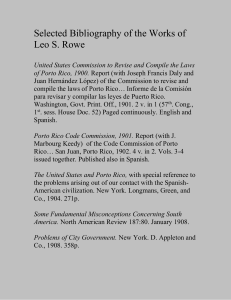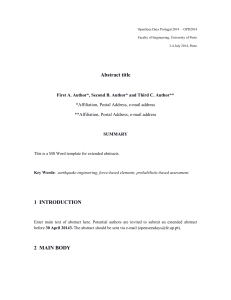The Gary Chapman International School on Digital Transformation is
advertisement
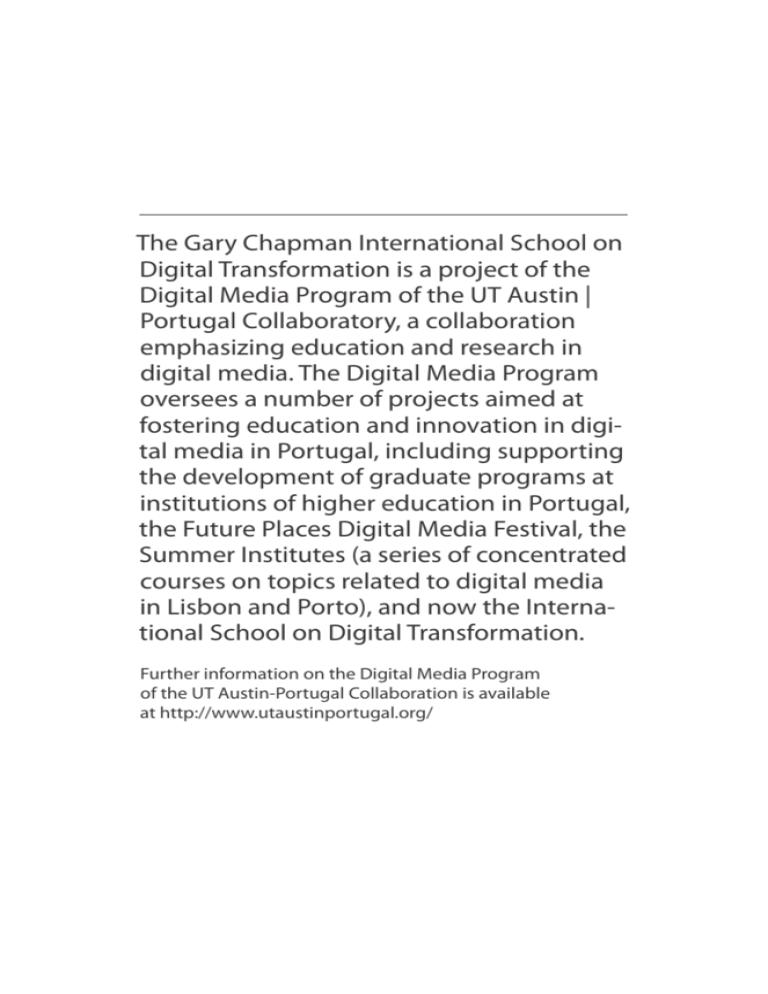
The Gary Chapman International School on Digital Transformation is a project of the Digital Media Program of the UT Austin | Portugal Collaboratory, a collaboration emphasizing education and research in digital media. The Digital Media Program oversees a number of projects aimed at fostering education and innovation in digital media in Portugal, including supporting the development of graduate programs at institutions of higher education in Portugal, the Future Places Digital Media Festival, the Summer Institutes (a series of concentrated courses on topics related to digital media in Lisbon and Porto), and now the International School on Digital Transformation. Further information on the Digital Media Program of the UT Austin-Portugal Collaboration is available at http://www.utaustinportugal.org/ 2 3 Welcome Welcome to the third year of the International School on Digital Transformation, now renamed the Gary Chapman International School on Digital Transformation. We’re so pleased once again to have such a distinguished faculty and such an impressive group of participants. The ISDT was originally established to bring together experienced innovators in the field of digital technology and communications with others interested in learning new techniques and exploring new ideas about harnessing the powers of new technologies for social change. The goal of the ISDT is to create a unique atmosphere for emerging and established scholars and activists to form sustained professional networks; cultivate collaboration and the ongoing exchange of ideas; and address important issues in digital media and civic participation, emergent cultural forms, and globalization. ISDT was inspired by Professor Gary Chapman, who taught at the LBJ School of Public Affairs at the University of Texas at Austin. Gary died in December 2010, and while we mourn his loss we are pleased to continue the School as a way of honoring his ambitions and as a contribution to his legacy. We would like to also take this opportunity to call attention to the support given to the ISDT by the University of Porto. The faculty and staff of the university have been integral to organizing the ISDT. The city of Porto is a culturally rich, beautiful location, and we are fortunate to have the city, and the university, as hosts for this week. We look forward to spending the week here with you. This booklet contains the schedule of events for the week, as well as brief faculty biographies, arranged alphabetically. While more complete information is available on the ISDT web site at http://digitaltransformationschool.org/2011, this program should serve as a pocket guide for the week’s events. As you can see in the schedule, each day has some designated “open time.” We anticipate many of you will want to organize informal activities or sessions to further pursue certain ideas as they emerge, to share skills, or to workshop some of your projects. We will together organize those informal meetings each day, and identify likely places where we can gather for these bar camp or “birds of a feather” sessions. Please let us know if you have any questions or concerns, and we will do our best to address them. Sincerely, The ISDT staff and the Digital Media Program of the University of Texas-Austin | Portugal Collaboration Organizing committee Ademar Aguiar, Artur Pimenta Alves, Heitor Alvelos, Susana Barreto, Karen Gustafson, Chris McConnell, Sónia Pinto, and Sharon Strover 4 5 ISDT Staff Artur Pimenta Alves | University of Porto Artur Pimenta Alves is the director for CoLab’s Digital Media Program for the University of Porto. In that role, he oversees both the implementation of programs including the Summer Institute and the development of Portugalbased graduate programs in digital media. In addition to serving as a professor of electrical and computer engineering, he is a consultant of the board of directors at INESC Porto. His research interests include digital video and image communication. Christopher McConnell | University of Texas at Austin Christopher McConnell is a doctoral student in Radio-TVFilm at UT-Austin, where he serves as the research assistant for the UT Austin | Portugal Digital Media Program. His research emphasizes participatory media on and off-line, and he’s presented work on Twitter, Web 2.0’s labor issues, and blogging. Outside the academy, Chris has worked as an animation producer, webmonkey, and magazine editor, writing for titles such as Enterprise Linux and ENT, as well as serving as the technology editor for Enterprise Systems Journal. Susana Barreto | University of Porto Susana Barreto is a graphic designer and a Postdoctoral fellow at Central Saint Martins, University of the Arts, London; currently teaching at the Faculty of Fine Arts, University of Porto and ESAD, Matosinhos in Portugal. Susana’s background is in graphic communication, and she has worked both as an academic, and a design practitioner in Portugal, Macau, and in England. Susana’s research interests are focused around the role of culture in graphic communication, cross-cultural design, branding, globalization, and design ethics. Sónia Pinto | INESC Porto Sónia Pinto has joined INESC Porto on June 1996 and in the last 15 years has taken on several different roles, such as working as Secretary Group Coordinator; Assistant to the Board of Directors and managing Scientific Events Production and Organization (MIC 2001; CARS&FOF2002; ISPIM 2005; MCDA63, MANUFUTURE 2007). She currently works at INESC Porto as a Specific Program Events Planner and also Produces Social and Corporate Events at an Events Producing Company. Karen Gustafson | University of Texas at Austin Karen Gustafson is the Austin-based program manager for Digital Media in the UT Austin | Portugal program. She received her Ph.D. from the Radio-TV-Film department at UT Austin, specializing in telecommunications policy and information society issues. In addition to coordinating the International School on Digital Transformation, she facilitates mobility grant activities, manages Austin-based summer programs, and serves as a co-curator of the Future Places digital media festival in Porto. Sharon Strover | University of Texas at Austin Sharon Strover is a Professor at UT-Austin and the director of CoLab’s Digital Media Program for UT Austin. She oversees the organization of the Summer Institute, internship and exchange programs, and the coordination of different Austin-based resources affiliated with the Digital Media area of the UT-Portugal collaboration. Her interests include telecommunication policy and the information society. Most recently, she has worked in Washington DC with the United States Department of Agriculture on its rural broadband deployment program. She writes frequently on rural development and technology issues. 6 7 Locations Emergency Contact Casa da Música Tel. 351 220 107 160 If you have an emergency and need to reach someone from the ISDT staff immediately, please call: Avenida da Boavista, 604-610 4149-071 Porto Sónia Pinto +351 916 885 340 (mobile) Hotel Eurostars Das Artes Tel. 351 222 071 250 If you have a medical or police emergency, please call 1-1-2, which is the Portuguese equivalent of the United States’ 911. Rua do Rosario, 160-164 4050-421 Porto English-speaking operators are normally available. Paço dos Duques de Bragança (Guimarães) Tel. 351 253 412 273 Rua Conde D. Henrique 4810-245 Guimarães Restaurante Porto & Virgula Tel. 351 222 012 452 Rua Campo Mártires de Pátria n° 51 4050-366 Porto – Vitória 8 9 Schedule of Events Sunday, 17 July Monday, 18 July 18:00 First Meeting 09:00 Laura Stein Carol Flake Chapman: Gary’s Global Tribe Sharon Strover & Artur Pimenta Alves: Welcome and Overview Hotel Eurostars Das Artes Policy, Participation and Power on YouTube, Facebook, Blogger and Wikipedia 18:45 Welcome reception 10:30 Open Time Hotel Eurostars Das Artes 20:00 Communal dinner Restaurante Porto e Virgula Hotel Eurostars Das Artes 16:00 Derek Lackaff Open Innovation as Digital Democracy Hotel Eurostars Das Artes 17:30 Coffee break 18:00 Diego Gómez Building community-based digital experiences Hotel Eurostars Das Artes 19:30 Break for dinner 20:00 Communal dinner Restaurante Porto e Virgula 10 Tuesday, 19 July 11 Wednesday, 20 July 09:00 Alison Powell 09:00 Fiorella De Cindio #FAIL: Black boxes, open-source, and the collaborative futures of the internet What after protests? Design issues and software tools toward deliberative democracy Hotel Eurostars Das Artes Hotel Eurostars Das Artes 10:30 Open time 10:30 Coffee break 16:00 Graham Attwell and Cristina Costa 11:00 Andy Carvin Session 1: Academia and their knowledge safes: how technology TBA influences or hinders innovative practice Session 2: The Democratisation of knowledge: What does it mean for learning? 12:30 Lunch on your own 17:30 Coffee break during the combined session 14:00 Ademar Aguiar 19:30 Break for dinner 20:00 Communal Dinner Restaurante Porto e Virgula Hotel Eurostars Das Artes Tomorrow’s Schools Start Today: Let’s Go! Hotel Eurostars Das Artes 15:30 Break 16:00 Depart for Paço Dos Duques, Guimarães Dinner excursion to the nearby city of Guimarães where a 15th century castle still dominates the landscape. Ends approximately 22:00; extra fee for additional people Paço dos Duques de Bragança 12 Thursday, 21 July 13 Friday, 22 July 09:00 Smári McCarthy 09:00 Leslie Regan Shade Infrastructure, Authority, and the Industrialization of the Internet Young Canadians, Participatory Digital Culture and Policy Literacy Hotel Eurostars Das Artes Hotel Eurostars Das Artes 10:30 Open time 10:30 Open time 16:00 Sunil Abraham 16:00 Jillian York India’s Unique Identity Number: The world’s largest biometric database Who Owns Your Content? Best Practices for Navigating the Quasi-Public Sphere Hotel Eurostars Das Artes Hotel Eurostars Das Artes 17:30 Coffee break 17:15 Coffee break 18:00 Sara de Freitas 17:30 TBA The Gamification of Life Hotel Eurostars Das Artes 19:30 Break for dinner 20:00 Communal dinner Restaurante Porto e Virgula Hotel Eurostars Das Artes 19:00 Farewell dinner Dinner at Casa da Música and Optional Concert Ends approximately 24:00; extra fee for additional people Restaurante da Casa da Música 14 15 Faculty Profiles Sunil Abraham | Centre for Internet and Society India’s Unique Identity Number: The world’s largest biometric database Sunil Abraham is the Director of Policy at the Centre for Internet and Society based in Bangalore. The Centre for Internet and Society aims to critically engage with concerns of digital pluralism, public accountability and pedagogic practices, in the field of Internet and Society, with particular emphasis on South-South dialogues and exchange. Sunil is a social entrepreneur and Free Software advocate. He founded Mahiti in 1998 which aims to reduce the cost and complexity of Information and Communication Technology for the Voluntary Sector by using Free Software. He was elected an Ashoka fellow in 1999 to ‘explore the democratic potential of the Internet’. He was granted a Sarai FLOSS fellow in 2003. Between June 2004 and June 2007, Sunil also managed the International Open Source Network a project of United Nations Development Programme’s Asia-Pacific Development Information Programme serving 42 countries in the Asia-Pacific region. Ademar Aguiar | University of Porto Tomorrow’s schools start today: Let’s go! Ademar Aguiar is a professor at Faculty of Engineering of University of Porto (FEUP) and researcher at INESC Porto, with over 20 years of experience on software engineering, and specialized on software design, agile methods, wikis and open collaboration tools. He is Vice-President of the Hillside Group, an educational non-profit that sponsors and promotes various conferences, events and publications related with software patterns (PLoP, EuroPLoP, ChiliPLoP, KoalaPLoP, SugarloafPLoP, ScrumPLoP, TPLoP, etc.). He is also member of the steering committee for the WikiSym, a series of international conferences devoted to research and practice on wikis and open collaboration. In the agile field, Ademar has been contributing to Scrum community and organizing Agile Portugal, in Porto. As an entrepreneur, Ademar is a founder of Tecla Colorida, which is working on new learning environments for preteens (4-12 years old), to enable schools’ communities teachers, students, families) to really benefit from the enormous educational power of today’s web technology (social learning, informal learning), and thus reduce the digital divide and schools-home divide. The main result is schoooools.com, a simple and intuitive collaborative and social platform that satisfies the growing needs for new ways of learning/teaching, supporting: more interactivity, social learning, informal learning, learning with games, co-creation of new digital media (online newspapers, web radio, web TV), end-user participation, and personalization, all integrated in a single platform that is anchored and respects the normal privacy rules of the underlying real social circles. 16 Graham Attwell | Pontypdysgu Academia and their knowledge safes: How technology influences or hinders innovative practice Graham Attwell is a researcher, speaker and blogger. He works for the Wales based research organization Pontypdysgu, which he founded in 1999. His work focuses on the use of new technologies for communication, creativity, learning and knowledge development and sharing. He is particularly interested in how such technologies can be used to extend learning outside the classroom and open up access to knowledge to those without access to formal education. This includes developing learning in different contexts, including the workplace and community. He is active in researching and developing new pedagogies for using technology or learning and in the training of teachers and trainers. He has worked in many international projects and is a visiting academic at the Institute for Employment Research at the University of Warwick, UK and the Institut Technik und Bildung at Bremen University, Germany. Although he publishes in academic books and journals, he prefers writing on his blog, the WalesWideWeb. 17 Andy Carvin | National Public Radio (U.S.) TBA Andy Carvin leads NPR’s social media strategy and is NPR’s primary voice on Twitter, and Facebook, where NPR became the first news organization to reach one million fans. He also advises NPR staff on how to better engage the NPR audience in editorial activities in order to further the quality and diversity of NPR’s journalism. During his time at NPR, Carvin has been interviewed on numerous NPR programs, including Morning Edition, All Things Considered, Talk of the Nation, Tell Me More and The Diane Rehm Show, as an expert on Internet policy and culture and related topics. As co-founder of PublicMediaCamp, Carvin has helped NPR and PBS stations around the country bring local tech communities and public media fans together to develop collaborative projects both online and offline. During natural disasters and other crises, Carvin has used his social integration skills to mobilize online volunteers. On September 11, 2001, he created SEPT11INFO, a news forum for the public to share information and help refute rumors in the wake of the 9-11 attacks. Following the tsunami off the coast of Indonesia in 2004, Carvin served as a contributing editor to TsunamiHelp, one of the leading sources of tsunami-related citizen journalism. More recently, he worked with CrisisCommons, to help with their development of shared technology solutions to improve emergency management and humanitarian activities in response to the 2010 earthquake in Haiti. 18 Carol Flake Chapman | Journalist Gary’s Global Tribe: A Conversation about Gary Chapman’s Unifying Vision of the Good Life Carol Flake Chapman has worked as editor and writer for several leading newspapers and magazines in the U.S., including the New York Times, the Boston Globe, the New Yorker, Harper’s, and Texas Monthly. She is also the author of several books on the subjects of culture, religion and community. She currently produces an electronic newsletter for the River Systems Institute at Texas State University on the subject of water, and her own Web site, Woman with Portfolio, focuses on the power of the individual to assess economic and investing information independently of Wall Street. She and her late husband Gary Chapman worked together on the goals of using technology as a means for creating community, for promoting open government and for improving the quality of life for all. 19 Cristina Costa | University of Salford The Democratisation of knowledge: what does it mean for learning? Cristina Costa is currently the Research Technologies Development Officer for the Research and Graduate College at the University of Salford, UK. She is also a part-time PhD student at the same institution. Cristina was recently named Learning Technologist of the Year 2010 by the Association for Learning Technology (ALT). She is also a Visiting Research Fellow at the Manchester Metropolitan University (Faculty of Health, Psychology and Social Care), UK. In the past, she worked as a foreign language teacher, and teacher trainer in the Portuguese Navy. Her research focus is on Education in a changing environment, with a special emphasis on the use of participatory media. She is particularly interested in analysing the advantages and also the implications of using the social web for teaching, learning, research, and social change and practice. 20 Fiorella De Cindio | University of Milano What after protests? Design issues and software tools toward deliberative democracy Fiorella De Cindio graduated summa cum laude in Physics in 1976. Since 1988 she has been an associate professor in the Department of Informatics and Communication at the University of Milano in Italy. After teaching Programming Languages and Distributed Systems Foundations for many years, she now teaches Software Engineering. She has been teaching a class on Virtual Communities since 2002 (which, starting next year, will be called “Internet-based Social Interactions”) with special emphasis on civic issues. Her research (represented by more than one hundred, national and international, scientific publications) is twofold. On the one hand, it focuses on languages and methods for the analysis, design and implementation of distributed systems, paying special attention to user involvement in the system development process (participatory design). On the other hand, most notably in the last fifteen years, her research focuses on the design and implementation of social interactive computer systems as well as their deployment in real life settings. Within this framework, she dedicated special attention to promoting civic participation and deliberation at the urban level, and to the development of software tools for supporting them. 21 In this context, she has been responsible for the field trials within the EU-IST TruE-Vote (a Secure and Trustable Internet Voting System based on PKI) project (2001-2003). In 2004 she has been charged by the Italian Ministry of Innovation of carrying on a survey on the state-of-the-art in Italy of e-participation technologies. In both fields, she invariably coupled research with field experience. To manage this integrated approach, she launched the Civic Informatics Laboratory (LIC) in 1994, which she still heads. Additionally, she set up the Milano Community Network (RCM), which is now an autonomous body, namely a Participatory Foundation. She is currently president of this organization. 22 Kay Firth-Butterfield | St. Edward’s University Associate Faculty Kay Firth-Butterfield teaches Communication and Global Studies at St. Edward’s University, Austin, Texas. Prior to moving to Texas, she worked in various areas of International law and child protection as a Barrister at Law and Judge in her home country, the United Kingdom. Much of her work involves the use of technology to bring the world into the classroom. As a result of one such venture, she is leading a group of students to work with street children and the victims of human trafficking in Cape Town during June 2011. Kay is North American Ambassador for the Consortium for Street Children, which has U.N. ECOSOC status. In September 2010, she attended the United Nations General Assembly (MDGs) for CSC. She serves on the Task Force against Human Trafficking set up by the AG of Texas and is a member of a scholars group appointed by the Head of UNICEF Child Protection Team to look at communication, education and child protection. In 2007, she became a Fellow of the Royal Society for the Encouragement of Arts, Manufactures and Commerce. She is a mediator and Liveryman of the City of London. In Austin, she is a member of the Calvert Inn of Court, an honorary member of the Austin Bar Association International Section and a member of ALLIES against Slavery. She serves on the Board of Directors of the Bernardo Kohler Centre, which is dedicated to helping victims of human trafficking obtain “T” Visas. She serves on the Access to Public Services Working Party of the Global Campaign Against Poverty. 23 Kay’s published work includes articles, reported cases and Judgments from her time as a practicing barrister. Currently she is researching various communication tools used to help in the rehabilitation of street children and the victims of human trafficking. 24 25 Sara de Freitas | University of Coventry The Gamification of Life Diego Gómez | Hiperbarrio Building community-based digital experiences Sara is Director of Research and Professor of Virtual Environments at the Serious Games Institute at the University of Coventry where she leads an applied research team working closely with industry. Sara holds a visiting fellowship at the University of London, is elected Chair of the Lab Group and is a Fellow of the Royal Society of Arts. She is also the Scientific Coordinator for the EU GALA network of excellence in Serious Games. Diego Gómez is a systems engineer, programmer, technology and education specialist, and co-founder of Hiperbarrio project which is a well known outreach community project based in Medellín (Colombia) that works with vulnerable communities promoting the use of digital media for social and civic engagement. Diego has worked for many Colombian institutions in projects related to the development of learning networks, e-learning and virtual communities. He is currently working for Unaula University (Medellín, Colombia) in the creation of new strategies for technologysupported learning and at Hiperbarrio he is in charge of internal research projects. Voted the Most Influential Woman in Technology 2009 and 2010 by US-based Fast Company, Sara also chairs the IEEE Serious Games and Virtual Worlds conferences (VS-Games) and is a regular speaker at international conferences. Sara currently holds 12 funded projects, funded through European, regional and national agencies. She sits on 31 programme committees for journals, books and conferences, has chaired 6 international conferences and has given over 80 presentations and lectures in the UK and abroad. Her current research includes e-learning innovation, multimodal interfaces, experience design and perceptual modelling in games and virtual worlds. Sara publishes widely with over 90 publications (reports, journal articles, conference papers and books) in the areas of: pedagogy and e-learning, change management and serious games and virtual worlds for supporting training and learning. Her latest books: Rethinking Learning for a Digital Age (edited with R. Sharpe and H. Beetham) is published by Routledge and Digital Games and Learning (edited with P. Maharg) is published by Continuum Press. 26 Derek Lackaff | Elon University Open Innovation as Digital Democracy Derek Lackaff is an Assistant Professor at Elon University, where he teaches in the School of Communication’s graduate program in Interactive Media. His research explores the relationships among communication processes and the development of sustainable social, economic, and media institutions. A current focus is the grassroots political projects that have emerged in Iceland in the wake of the 2008 economic collapse, most of which utilize innovative ICT strategies to develop more direct democratic institutions and promote citizen political engagement. His research on sociotechnical communication systems has appeared in Journal of Information Technology & Politics, CyberPsychology, Behavior, and Social Networking, Proceedings of the SIGCHI Conference on Human Factors in Computing Systems, Journal of Computer-Mediated Communication and elsewhere. He was previously a Postdoctoral Fellow with the UT Austin | Portugal Program in Advanced Digital Media, and taught at UT Austin and the University of Porto. 27 Smári McCarthy | International Modern Media Institute Infrastructure, Authority, and the Industrialization of the Internet Smári McCarthy is research director at the International Modern Media Institute (IMMI) and co-founder of the Icelandic Digital Freedoms Society. He also founded the Shadow Parliament Project, an attempt to crowdsource democracy, and worked on developing and spreading digital fabrication technology. 28 Alison Powell | London School of Economics 29 Leslie Regan Shade, Concordia University Topic: #FAIL: Black boxes, open-source, and the collaborative futures of the internet. Topic: Young Canadians, Participatory Digital Culture and Policy Literacy Dr Alison Powell is a writer and scholar. She is currently LSE Fellow in Media and Communications at the London School of Economics. Her work examines the intersection of technology, art, and politics, focusing on how culture, politics, and networks are co-produced. She has researched the politics of local and distributed networks and analyzed the relationships between design metaphors and network architecture. She teaches critical theory on the Msc programs at the LSE, and has lectured widely on digital and social media, politics, and participation. Alison was the recipient of an Ontario Graduate Scholarship and Canada Graduate scholarship for her doctoral work, and a Social Science and Humanities Research Council fellowship for her postdoctoral work. Leslie Regan Shade is an Associate Professor at Concordia University in the Department of Communication Studies. Her research focus since the mid-1990s has been on the social, policy, and ethical aspects of information and communication technologies (ICTs), with particular concerns towards issues of gender, youth, globalization, and political economy. The research contributions straddle the line between academic and non-academic audiences, including policymakers and non-profit groups. She is the author of Gender and Community in the Social Construction of the Internet (Peter Lang, 2002), co-editor of Feminist Interventions in International Communication (with Katharine Sarikakis, Rowman & Littlefield, 2008), two volumes in Communications in the Public Interest (edited with Marita Moll, Canadian Centre for Policy Alternatives) and with Moll, For Sale to the Highest Bidder: Telecom Policy in Canada (CCPA, 2008), and editor of Mediascapes: New Patterns in Canadian Communication, Third Ed. (Nelson Canada, 2010). Articles have also appeared in Continuum, The Gazette, Canadian Journal of Communication, and Government Information Quarterly. She is now working on a SSHRC funded project called Young Canadians, Participatory Digital Culture and Policy Literacy. She has a PhD degree from McGill University and MLIS from UCLA and a BA in Communications-Visual Arts from UCSD. For more information see http://leslieshade.ca/. 30 31 Laura Stein, University of Texas at Austin Jillian C. York | Electronic Frontier Foundation Laura Stein is an Associate Professor in the Radio-TelevisionFilm Department at the University of Texas at Austin. She writes about alternative and activist media, political communication, and communication law and policy. Her books include two co-edited volumes, Making Our Media: Global Initiatives Toward a Democratic Public Sphere (examining grassroots attempts to transform the policy and practice of information and communication media around the world) and Speech Rights in America: The First Amendment, Democracy and the Media (exploring the failure of neoliberal understandings of speech rights to protect democratic communication in the media). Jillian C. York recently joined the Electronic Frontier Foundation as their Director of International Freedom of Expression. Prior to joining EFF, Jillian was based at the Berkman Center for Internet & Society at Harvard, where her work focused on Internet content controls, including government-level Internet filtering, intermediary censorship, circumvention technology, and DDoS. She is particularly interested in digital activism and online free expression, with a special focus on the Arab world, and was actively engaged in analyzing the use of technology in recent uprisings in Tunisia and Egypt. Jillian writes about Internet policy, free expression, online activism, and social change in a regular column for Al Jazeera English, and contributes to other publications, including The Guardian and Index on Censorship. She writes for and is on the Board of Directors of Global Voices Online, and is the cofounder of the edited blogging forum Talk Morocco, which in 2010 won a Deutsche Welle Best of Blogs award. Jillian is a recognized expert in the field of free expression, and speaks regularly on related issues, most recently at SXSW, the National Conference for Media Reform, and re:publica. Policy, Participation and Power on YouTube, Facebook, Blogger and Wikipedia Who Owns Your Content? Best Practices for Navigating the Quasi-Public Sphere
